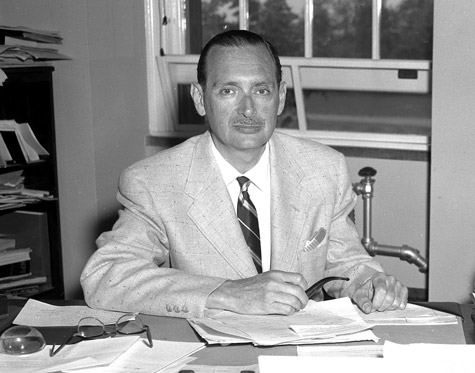
Read this exclusive guest post from Michael Cannell, author of Incendiary: The Psychiatrist, the Mad Bomber, and the Invention of Criminal Profiling, and make sure to sign in and comment below for a chance to win a signed copy of the book!
New York convulsed with anxiety in 1956 as police searched in vain for a serial bomber known as the “Mad Bomber of New York.” The mystery bomber had planted 32 homemade explosives in the city’s most crowded public spaces. He had yet to kill, but it was only a matter of time. The New York Journal-American—an afternoon newspaper of scrappy disposition—called him “the greatest individual menace New York City ever faced.”
In desperation, bomb squad detectives contacted James A. Brussel, a psychiatrist with a particular interest in the workings of the criminal mind. He theorized that he could help describe the bomber by applying “common psychiatric principles in reverse.” Instead of starting with a known personality and anticipating their behavior, as psychiatrists normally do, he hoped to let the mystery bomber’s behavior define his identity—his sexuality, race, appearance, work history and personality type.
Dr. Brussel called it reverse psychology. Today we call it profiling. Whatever the term, it was still an untested concept in the 1950s. Nobody had yet profiled an offender. Not in real life, anyway. Brussel’s only role models were fictional investigators. It was a case of life imitating art. Here are four literary sleuths who profiled offenders decades before the term was coined:
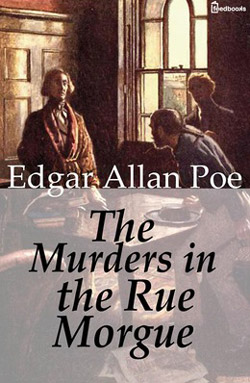 C. Auguste Dupin
C. Auguste Dupin
In the 1840s, Edgar Allan Poe created C. Auguste Dupin, a reclusive amateur detective from an illustrious family fallen on hard times. He was the first of his kind—a master of channeling the psychotic mind and the forebear of fictional detectives to come. (Though, Poe never used the word “detective.”)
With his uncanny deductive powers, Dupin is capable of solving convoluted murder mysteries in the seamy reaches of 18th-century Paris. Like a master profiler, Dupin can divine the hidden offender and their entire backstory from bits of hair, scratch marks, torn clothing, and other observable details that baffled the bumbling Paris gendarmes.
Dupin succeeds as a detective because he understands the criminal’s viewpoint, a lesson that would be critical for real-life psychiatrist James Brussel. In “The Murders in the Rue Morgue,” Poe wrote that Dupin “throws himself into the spirit of his opponent, identifies himself therewith, and not infrequently sees thus, at a glance, the sole methods by which he may seduce into error or hurry into miscalculation.”
Dupin was the first great fictional crime solver, but he was short-lived. Poe wrote only three Dupin stories. What’s more, Poe never put much flesh on his character. The stories were more about the puzzle than the person.
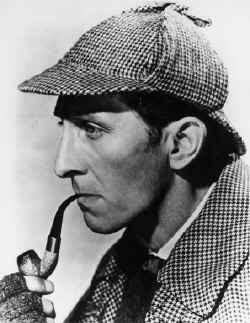 Sherlock Holmes
Sherlock Holmes
Sir Arthur Conan Doyle picked up where Poe left off, introducing Sherlock Holmes in 1887. With his deerstalker hat and pipe, Holmes still stands tallest among the fictional detectives. We know him from classic stories like “The Adventure of the Speckled Band” and The Hound of the Baskervilles. Or, more likely, we know him from screen adaptions starring Robert Downey, Jr., and Benedict Cumberbatch.
Holmes is Dupin 2.0, an amplified version of the original profiler but with many of the same quirks. Both are well-educated recluses with eccentric manners and uncanny powers of observation. Neither had friends, aside from their sidekicks. They are so similar, in fact, that The New York Times, in its first mention of Holmes in 1892, chided Conan Doyle for failing to acknowledge how much he borrowed from Poe.
The difference is mostly one of scale; while Poe wrote three Dupin stories, Conan Doyle wrote 56 Holmes short stories and four novels. The real wonder of Holmes is his enduring appeal. Every generation seems to create their own iteration.
Lord Peter Wimsey
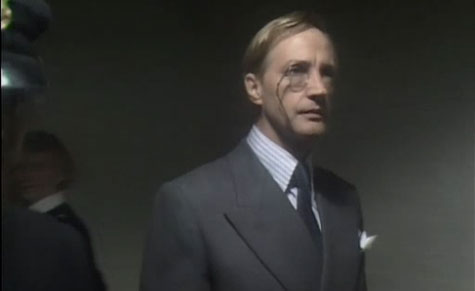
By the end of the 19th century, Poe and Conan Doyle had established a trope—the urbane amateur detective with oddball habits and an almost clairvoyant ability to translate evidence into a detailed vision of the wrongdoer at large. Their leading men—Dupin and Holmes—were bachelor profilers who, by coincidence, bore strong resemblance to the real-life profiler Dr. James Brussel.
The pattern continued in the 1920s with Lord Peter Wimsey, a dilettante detective created by an Oxford scholar named Dorothy L. Sayers. Her previous books had been slender poetry volumes. Wimsey’s debut (“Whose Body?”) reads like a Holmes parody, with a corpse wearing nothing but a gold pince-nez discovered in a London bathtub. Lord Wimsey prattles on in the effected banter of P.D. Wodehouse’s upper-class twits. But when the body is found, Wimsey reveals himself to be a man of penetrating intelligence with a profiler’s knack for absorbing the evidence—in this case a revealing detail of the corpse’s anatomy, a missing financier, and Peruvian oil shares.
Hercule Poirot
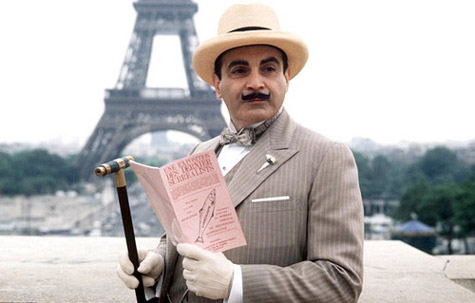
Agatha Christie, the so-called Queen of crime, had an entirely different kind of man in mind when she conjured Hercule Poirot. While Dupin, Holmes, and Wimsey are dashing loners, Poirot is the opposite: a dandified former detective with a cherubic face and a comical preoccupation with his hair and mustache. He’s Belgian, and Christie made his accent a point of humor.
For all his silliness, Poirot most closely resembles real-life profilers. More than his predecessors, he relies on his knowledge of human psychology and a fierce intellect. He is the one who most skillfully and convincingly takes in the evidence and, as the information accrues, grasps a clear-eyed sense of the culprit’s identity. “Rest assured,“ Poirot said. ”I am the best!”
Comment below for a chance to win a signed copy of Incendiary by Michael Cannell!
To enter, make sure you're a registered member of the site and simply leave a comment below.
TIP: Since only comments from registered users will be tabulated, if your user name appears in red above your comment—STOP—go log in, then try commenting again. If your user name appears in black above your comment, You’re In!
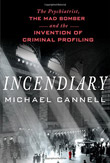 Incendiary Comment Sweepstakes: NO PURCHASE NECESSARY TO ENTER OR WIN. A purchase does not improve your chances of winning. Sweepstakes open to legal residents of 50 United States, D.C., and Canada (excluding Quebec), who are 18 years or older as of the date of entry. To enter, complete the “Post a Comment” entry at https://www.criminalelement.com/blogs/2017/04/a-pioneering-profiler-and-his-fictional-forerunners-comment-sweepstakes beginning at 4:00 p.m. Eastern Time (ET) April 13, 2017. Sweepstakes ends 3:59 p.m. ET April 25, 2017. Void outside the United States and Canada and where prohibited by law. Please see full details and official rules here. Sponsor: Macmillan, 175 Fifth Ave., New York, NY 10010.
Incendiary Comment Sweepstakes: NO PURCHASE NECESSARY TO ENTER OR WIN. A purchase does not improve your chances of winning. Sweepstakes open to legal residents of 50 United States, D.C., and Canada (excluding Quebec), who are 18 years or older as of the date of entry. To enter, complete the “Post a Comment” entry at https://www.criminalelement.com/blogs/2017/04/a-pioneering-profiler-and-his-fictional-forerunners-comment-sweepstakes beginning at 4:00 p.m. Eastern Time (ET) April 13, 2017. Sweepstakes ends 3:59 p.m. ET April 25, 2017. Void outside the United States and Canada and where prohibited by law. Please see full details and official rules here. Sponsor: Macmillan, 175 Fifth Ave., New York, NY 10010.
To learn more or order a copy, visit:
opens in a new window![]() opens in a new window
opens in a new window![]()
Michael Cannell is the author of The Limit: Life and Death on the 1961 Grand Prix Circuit and I.M. Pei: Mandarin of Modernism. He was editor of the New York Times House & Home section for seven years and has written for The New Yorker, The New York Times Magazine, Sports Illustrated, and many other publications. He lives in New York City.

I wonder what kind of profile applies to people who post here?
Interesting.
Great post! Would love to win a copy!
Profilers are a standard trope in our crime fiction, along with the dim-witted policeman and the disspirited private decetive. We need some new charactors.
Do cities “convulse with anxiety”? Perhaps they “seize up with anxiety.” Personally, I would say “New York throbbed with anxiety.” Great post!
Interesting, would love to read it.
different
Took a class some years ago on kinesic interviewing techniqus. This was the first I had heard of Dr. Brussel. look forward to reading this one…
Would love to read this. Wish me luck!
I am fascinated with profilers
I have just finished watching “Criminal Minds” on TV. Is this show based on his work? Each show features FBI agents profiling a targeted criminal and/or victim.
Also, each show features mapping as a means of narrowing down the target population. Does Dr. Brussel use this technique and does he have an opinion on its use? If so, how does a person get into this area of criminology?
It was so exciting to find out about the ORIGINAL profiler and then learn that he was on the NYC police force! I wonder if he contributed to the show in any way and am curious as to his thoughts on criminal shows and its effects on the TV viewers and potential criminals. How does one pioneer an area of Criminology such as Profiling into a scientific method of Criminology? Does he have any ideas about what lies ahead in Criminology/profiling?
Sounds intriguing!
Would love to learn more about the history of profiling.
Would love to read this!
I find it fascinating that so much of what I was taught in when I attended the NYPD Academy had it’s basis in the works of fictional detectives
This sounds very interesting.
This would be a great late night read.
looks awesome.
I would like this.
Look forward to reading this. Thanks!
Profilers always seem to be obnoxious as people, don’t they?
Profiling is fascinating.. thanks for the info, looking forward to reading the book!
For sure on my TBR list.
I would love to read the book.
that was nice to see these people together 😀
I’ve been fascinated by profiling for as long as I can remember but can’t remember when this fascination began, more than likely in my case with movies, TV, and the news. Will appreciate all of the featured novels all the more for learning how ahead of the times their personality profiling analyses actually were.
Early profiling, interesting.
Interesting post, would like to read the book.
Would love to win!
Looking forward to reading this… Thank you for the guest post and the entry opportunity!
interesting thanks for giveaway
A very interesting giveaway.
Lord Peter Wimsey has to be my favorite private investigator, if he could be called that. (It’s not like he ever hung up a shingle.) The ‘profilers’ in fiction have always been my favorites.
This nonfictional story sounds intriguing. It would be very interesting to read about this case that I have never heard of!
This nonfictional story sounds intriguing. It would be very interesting to read about this case that I have never heard of!
Profiling is so fascinating. Would love to win this one.
i’ve read most of Agatha Christie’s novels and seen the PBS adaptions – really enjoy the everday crimes that no one suspects. I have read a few Conan Doyle novels – I do like the modern Robert Downey Jr but do not care for Cumberbatch. I’ve read mysteries for years and have a keen interest in learning why killers do what they do –
sounds like a good one
This will be such an interesting book. I can’t wait to read it.
This sounds like an interesting read – the subject is fascinating.
This book sounds like a great read. It’s going on my TBR list but I am really hoping I pull off a win!
People who want to win post here! Yes!
I’d love to learn more about how profiling developed. This sounds like a great book.
Love reality based tales
All very fascinating for sure. My brother in law is a retired undercover agent with the FDA and they use profiling. Profiling just goes to show you how predictable people are.
This sounds like a fascinating read.
Amazing to learn how recent profiling is…
Great!
Yes, please enter me in this sweepstakes.
Thanks —
I am very interested in this topic! I hope the book will help me profile my ex-sister-in-law! (Before she commits a crime!)
Very timely considering the recent theories about Jack the Ripper.
I have never heard this story about the 1956 bombings in NYC, nor of Dr. Brussel. Very interesting to read of this first profiling experience. Especially when his idea and process were apparently drawn from the literary world. Would be a great book to read!
Often thought about how interesting it would be to be a profiler.
I have read other books on profiling. This sounds like a great one.
I have read other books on profiling. This sounds like a great one.
Forensics, profiling: all make for interesting reading in crime novels. And the detectives described are some of the greatest literary creations ever–who have provided me with hours of engrossing reading.
Enjoy reading and watching about investigative profiling. Thank you for this contest opportunity!
Notice how none of the profilers cited are women?
I am really looking forward to reading this.
The book sounds interesting.
I want to WIN this big time.
I wonder how accurate profiling is.
I’d like to know more about the art of profiling. Also think I’ll look up and read Poe’s C. Auguste Dupin’s stories.
I really want to win this book!
would LOVE to win this!
would LOVE to win this!
Looks like a great read
sounds great sign me up
Count me in please!
thanks for the chance to win
Sounds awesome!!~
Sounds awesome!!~
I find this very fascinating
Thanks for the chance
I would like to read the work of Michael Cannell.
Sounds great!
Thanks so much for the chance 🙂
would love to have this, thanks
would love to have this, thanks
Thanks for throwing this A Pioneering Profiler and His Fictional Forerunners Sweepstakes!
I would Love to win.
Thanks for the great giveaway!
What interesting men who could profile criminals!
Profiling is fascinating to me; I’d love to win a copy of this book.
What a superb article–the book should be a keeper
Hope to win!
Hope to win!